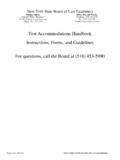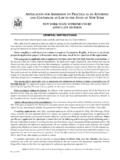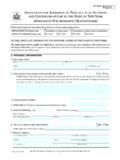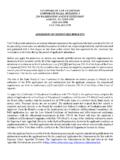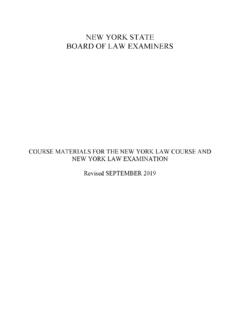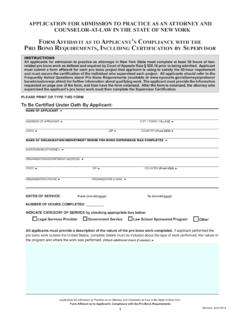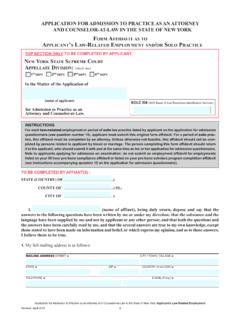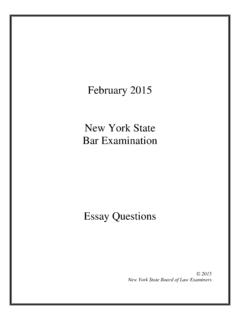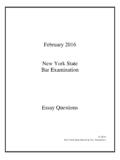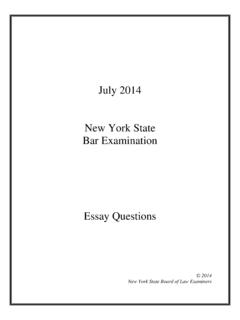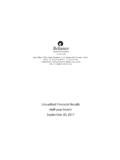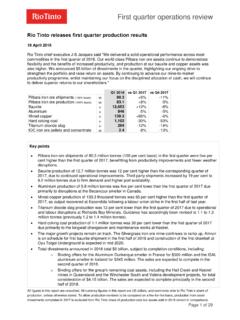Transcription of February 2017 New York State Bar Examination
1 February 2017 New york State Bar Examination MEE & MPT Questions 2017 National Conference of Bar Examiners 2017 National Conference of Bar Examiners These materials are copyrighted by the NCBE and are reprinted with the permission of NCBE. These materials are for personal use only and may not be reproduced or distributed in any way. 1 MEE 1 On June 15, a professional cook had a conversation with her neighbor, an amateur gardener with no business experience who grew tomatoes for home use and to give to relatives. During the conversation, the cook mentioned that she might be interested in branching out into making salsa and that, if she did branch out, she would need to buy large quantities of tomatoes.
2 Although the gardener had never sold tomatoes before, he told the cook that, if she wanted to buy tomatoes for salsa, he would be willing to sell her all the tomatoes he grew in his half-acre home garden that summer for $25 per bushel. Later on June 15, shortly after this conversation, the cook said to the gardener, I m very interested in the possibility of buying tomatoes from you. She then handed a document to the gardener and asked him to sign it. The document stated, I offer to sell to [the cook] all the tomatoes I grow in my home garden this summer for $25 per bushel. I will hold this offer open for 14 days. The gardener signed the document and handed it back to the cook. On June 19, the proprietor of a farmers market offered to buy all the tomatoes that the gardener grew in his home garden that summer for $35 per bushel.
3 The gardener, happy about the chance to make more money, agreed, and the parties entered into a contract for the gardener to sell his tomatoes to the proprietor. On June 24, the cook, who had not communicated with the gardener since the June 15 conversation, called the gardener. As soon as the cook identified herself, the gardener said, I hope you are not calling to say that you want my tomatoes. I can t sell them to you because I have sold them to someone else. The cook replied, You can t do that. I called to accept your offer to sell me all your tomatoes for $25 per bushel. You promised to hold that offer open for 14 days. I accept your offer! Is the gardener bound to sell the cook all the tomatoes he grows that summer for $25 per bushel?
4 Explain. 2017 National Conference of Bar Examiners These materials are copyrighted by the NCBE and are reprinted with the permission of NCBE. These materials are for personal use only and may not be reproduced or distributed in any way. 2 MEE 2 Forty years ago, Settlor, a successful businesswoman, married a less-than-successful writer. Settlor and her husband had two children, a son and a daughter. Two years ago, Settlor transferred most of her wealth into a revocable trust. Under the terms of the trust instrument, a local bank was designated as trustee, and the trustee was directed to distribute all trust income to Settlor during her lifetime. The trust instrument further provided that upon Settlor s death, the trustee will distribute trust principal to one or more of Settlor s children as Settlor shall appoint by her duly probated last will or, in the absence of such appointment, to Charity.
5 The trust instrument also stated that Settlor s power of revocation was exercisable only during Settlor s lifetime and by a written instrument. Following the creation of the trust, Settlor gave written direction to the trustee to accumulate trust income instead of distributing the income to Settlor as specified in the trust instrument. The trustee did so. Six months ago, Settlor executed a valid will. The will, exercising the power of appointment created under Settlor s revocable trust, directed the trustee of Settlor s trust, upon Settlor s death, (1) to distribute half of the trust assets to Settlor s daughter, (2) to hold the other half of the trust assets in continuing trust and pay income to Settlor s son during the son s lifetime, and (3) upon the son s death, to distribute the trust principal in equal shares to the son s surviving children (grandchildren of Settlor).
6 Settlor also bequeathed $50,000 to my descendants, other than my children, in equal shares, and she left the residue of her estate to her husband, whom she also named as the executor of her estate. Two months ago, Settlor died. At Settlor s death, the trust assets were worth $500,000 and Settlor s probate assets were worth $100,000. Settlor was survived by her husband, her daughter, her son, and her son s child (Settlor s grandchild, age 18). 2017 National Conference of Bar Examiners These materials are copyrighted by the NCBE and are reprinted with the permission of NCBE. These materials are for personal use only and may not be reproduced or distributed in any way. 3 A statute in this jurisdiction provides that a decedent s surviving spouse is entitled to a one-third elective share of the decedent s probate estate.
7 There are no other relevant statutes. 1. Was it proper for the trustee to accumulate trust income during Settlor s lifetime? Explain. 2. Under Settlor s will and the trust instrument, what, if any, is Charity s interest in the trust assets? Explain. 3. Does Settlor s husband have a valid claim to any trust or probate assets? Explain. MEE 3 In 2005, Andrew and Brenda began living together in State A while both were attending college there. Andrew proposed marriage to Brenda, but she refused. However, after learning that she was pregnant, Brenda told Andrew that she wanted to marry him before the baby was born. Andrew was thrilled and told her that they were already married in the eyes of God.
8 Brenda agreed. Andrew and Brenda did not obtain a marriage license or have a formal wedding. Nonetheless, Brenda started using Andrew s last name even before their daughter, Chloe, was born. After Andrew graduated from college and started a new job, he listed Brenda as his spouse so that she could qualify for benefits through Andrew s employer. They also filed joint income tax returns. In March 2007, just after Chloe s first birthday, Andrew and Brenda decided to separate. They had little property to divide and readily agreed to its disposition. Andrew agreed that Brenda should have sole custody of Chloe, and Brenda, desiring the cleanest break possible, agreed that Andrew would not be responsible for any child support.
9 Andrew told Brenda that no formal divorce was necessary because they had never formally married. In June 2007, Brenda and Chloe moved to start a new life in State B. Andrew sent Chloe an occasional card or birthday gift, but otherwise maintained no contact with Chloe or Brenda. Not long after settling in State B, Brenda met and fell in love with Daniel. 2017 National Conference of Bar Examiners These materials are copyrighted by the NCBE and are reprinted with the permission of NCBE. These materials are for personal use only and may not be reproduced or distributed in any way. 4 In 2008, Brenda and Daniel obtained a State B marriage license and wed. Thereafter, Daniel formed a close and loving bond with Chloe.
10 Indeed, with only very infrequent contact from Andrew, Chloe regarded Daniel as her father and called him Dad. In January 2017 , Brenda purchased a lottery ticket. The ticket won a jackpot of $5 million, which was paid that month. Shortly thereafter, Brenda informed Daniel that she wanted a divorce and that she intended to use her lottery winnings to launch a new life with Chloe in a distant State and break off all contact with Daniel. When Chloe learned about this, she became very upset because she continues to regard Daniel as her father. State A recognizes common law marriage. State B formerly allowed common law marriage until a statute, enacted in 2001, prospectively barred the creation of new common law marriages within the State .
